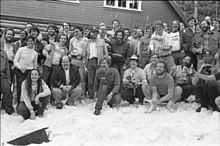Steve Bellovin
| Steven M. Bellovin | |
|---|---|

Bellovin at the 1984 Summer Usenix Conference in Salt Lake City (in a hat, standing in front of Dennis Ritchie).
|
|
| Born | Brooklyn, New York |
| Nationality | USA |
| Education |
|
| Alma mater | Columbia University |
| Doctoral advisor | David Parnas |
| Known for | USENET; computer security; firewalls; cryptography |
Steven M. Bellovin is a researcher on computer networking and security. He is currently a Professor in the Computer Science department at Columbia University, having previously been a Fellow at AT&T Labs Research in Florham Park, New Jersey.
In September 2012, Bellovin was appointed Chief Technologist for the United States Federal Trade Commission, replacing Edward W. Felten, who returned to Princeton University.
In February 2016, Bellovin became the first technology scholar for the Privacy and Civil Liberties Oversight Board.
He received a BA degree from Columbia University, and an MS and PhD in Computer Science from the University of North Carolina at Chapel Hill.
As a graduate student, Bellovin was one of the originators of USENET. He later suggested that Gene Spafford should create the Phage mailing list as a response to the Morris Worm.
He and Michael Merritt invented the Encrypted key exchange password-authenticated key agreement methods. He was also responsible for the discovery that one-time pads were invented in 1882, not 1917, as previously believed.
Bellovin has been active in the IETF. He was a member of the Internet Architecture Board from 1996–2002. Bellovin later was Security Area co-director, and a member of the Internet Engineering Steering Group (IESG) from 2002–2004. He identified some key security weaknesses in the Domain Name System; this and other weaknesses eventually led to the development of DNSSEC.
...
Wikipedia
